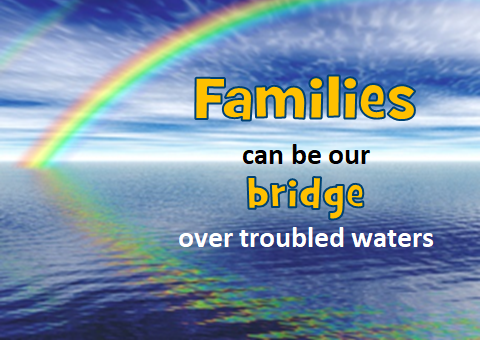 The push-pull of modern life keeps us and our families under pressure and on edge. This tends to drive us apart into isolated cells delimited by our social media networks and devices. Often we turn to our cyber worlds for assistance, distraction and relief.
The push-pull of modern life keeps us and our families under pressure and on edge. This tends to drive us apart into isolated cells delimited by our social media networks and devices. Often we turn to our cyber worlds for assistance, distraction and relief.Through social media we identify resources, engage with like-minded people and access “witnesses” to share our stories. We tolerate nasty and unwelcome trolls as the “cost of doing business” because those elusive witnesses hold tremendous –and seductive–power.
Witnessing holds transformational power that is frequently underappreciated. Feeling witnessed can provide validation of one’s experience, hope in the face of devastating circumstances, and can fuel persistence when commitment flags. Is it any wonder that we turn to our devices to access this resource?
Instead of depending on our tech devices for this sort of validation and witness, imagine the benefit that might accrue if we created a healthy sense of witness and validation for one another within our families. Hold that thought. Imagine building a family-based sense of connection, validation, and witness. So how might we accomplish that?
- Step 1: Listen. Listen with absolute neutrality and total attention. Resist the temptation to fix it–whatever “it” is. Simply be present, like a camera recording yet not intervening.
- Step 2: To ensure accuracy, capture the essence of what they said using their words.
- Step 3: Confirm that you got it right. Repeat the process until you do have an accurate restatement of their words and experience.
- Step 4: Ask them, “How would you like me to support you?” Note that you are not assuming they need you to solve the problem for them. You are offering to work with them if they want it. They may not; they may prefer to handle it on their own
- Step 5: Affirm three things: first, that you appreciate their opening up to you, second, that you know they can handle it, and third, you remain willing to help.
Intentional parenting depends on having goals, designing strategies and implement action plans which we refine as we go along. Take time to consider how you can bear powerful witness to each member of your family.
What will be the first step you’ll take, the first change you’ll make to ensure that your family provides a safe harbor for one another?
- Call us at 1-800-653-9445
- Listen to our podcasts: Adoption Matters: Real People. Real Life. Real Talk and Essentials of Adoption Attuned Parenting
- Watch our YouTube channel
- Read Books written by our coaches
- Click to learn more about Adoption Attuned Certified coaching!


